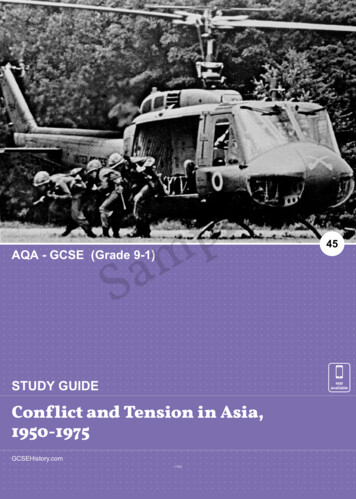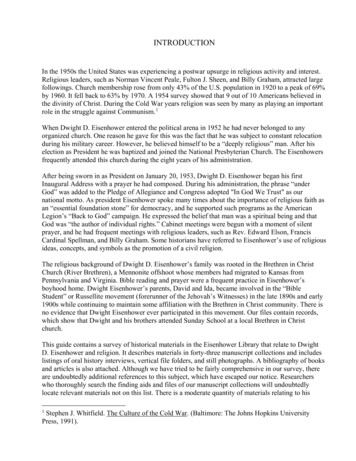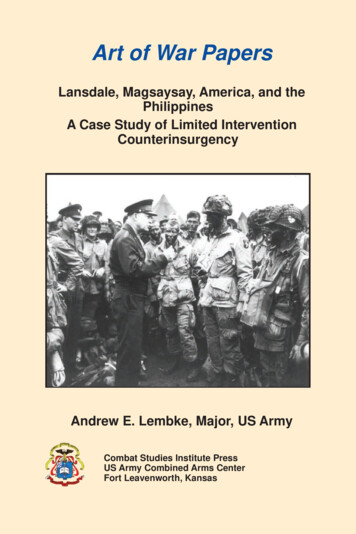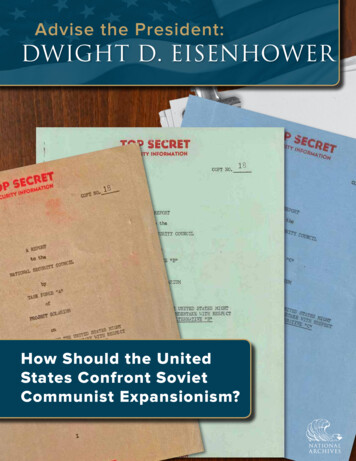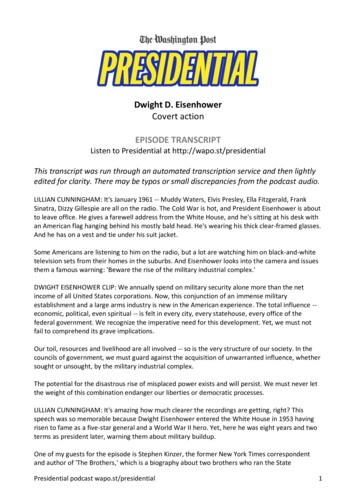
Transcription
Dwight D. EisenhowerCovert actionEPISODE TRANSCRIPTListen to Presidential at http://wapo.st/presidentialThis transcript was run through an automated transcription service and then lightlyedited for clarity. There may be typos or small discrepancies from the podcast audio.LILLIAN CUNNINGHAM: It's January 1961 -- Muddy Waters, Elvis Presley, Ella Fitzgerald, FrankSinatra, Dizzy Gillespie are all on the radio. The Cold War is hot, and President Eisenhower is aboutto leave office. He gives a farewell address from the White House, and he's sitting at his desk withan American flag hanging behind his mostly bald head. He's wearing his thick clear-framed glasses.And he has on a vest and tie under his suit jacket.Some Americans are listening to him on the radio, but a lot are watching him on black-and-whitetelevision sets from their homes in the suburbs. And Eisenhower looks into the camera and issuesthem a famous warning: 'Beware the rise of the military industrial complex.'DWIGHT EISENHOWER CLIP: We annually spend on military security alone more than the netincome of all United States corporations. Now, this conjunction of an immense militaryestablishment and a large arms industry is new in the American experience. The total influence -economic, political, even spiritual -- is felt in every city, every statehouse, every office of thefederal government. We recognize the imperative need for this development. Yet, we must notfail to comprehend its grave implications.Our toil, resources and livelihood are all involved -- so is the very structure of our society. In thecouncils of government, we must guard against the acquisition of unwarranted influence, whethersought or unsought, by the military industrial complex.The potential for the disastrous rise of misplaced power exists and will persist. We must never letthe weight of this combination endanger our liberties or democratic processes.LILLIAN CUNNINGHAM: It's amazing how much clearer the recordings are getting, right? Thisspeech was so memorable because Dwight Eisenhower entered the White House in 1953 havingrisen to fame as a five-star general and a World War II hero. Yet, here he was eight years and twoterms as president later, warning them about military buildup.One of my guests for the episode is Stephen Kinzer, the former New York Times correspondentand author of 'The Brothers,' which is a biography about two brothers who ran the StatePresidential podcast wapo.st/presidential1
Department and the CIA during Eisenhower's administration. I asked Stephen about Ike'scautionary plea against the military industrial complex.STEPHEN KINZER: I think his warning against it was sincere. It's certainly a warning we've fullyignored. But I think there's another subtext that people don't often understand: When he wasrailing against inflated defense budgets and giant military establishments, what he was also sayingis: Covert action is the way to go. We don't need to invade countries anymore. We have ways tooverthrow regimes and foment Civil War and start problems covertly.So, by warning against the growth of the huge military establishments, what he was saying isessentially, 'My policy was right: small military establishment, nuclear deterrent, and secret butintense campaigns of covert action.'LILLIAN CUNNINGHAM: In this episode, we'll be exploring two types of covert action: theinternational espionage type and how the use of that under Ike's administration started to changethe perception of America's leadership on the global stage, and then the other type of covertaction is the kind that Eisenhower practiced as part of his own leadership style -- a sort of workingbehind the scenes to accomplish his agenda.So, let's dive right into the American presidency of the 1950s. I'm Lillian Cunningham with TheWashington Post, and this is the 33rd episode of “Presidential.”PRESIDENTIAL THEME MUSICLILLIAN CUNNINGHAM: We have two fantastic guests for this episode -- University of Virginiaprofessor and historian Will Hitchcock and Stephen Kinzer, whom you heard from a moment ago.I'm going to turn first here to Will, who spent about eight years working on a biography of DwightEisenhower that's set to come out pretty soon.So, Will, what was Ike's childhood like? And I'm particularly fascinated by the detail that hismother was a pacifist. But maybe you could just paint a portrait of the home he grew up in.WILL HITCHCOCK: Sure, well Eisenhower was born in Texas, actually, and he lived there just only acouple of years and moved back to Abilene, Kansas, which is where his parents had originallyfounded a family.And he grew up in Abilene in very modest -- I think, really, even one could say poor -- familycircumstances. He was one of six boys. And those six boys shared two bedrooms. Four of the boysslept in each other's bed. His father worked in a creamery, and Eisenhower and all of his brothersalso worked in the creamery in the summer and after school.They were a hardscrabble sort of Central Plains family that worked very hard, that were poor, thatwent to church regularly. They came from a Mennonite community. And Eisenhower, pretty muchevery night, gathered with his father and the family Bible and they read scripture together. Hisparents did later go on to become Jehovah's Witnesses, and that is interesting when you think thatEisenhower became one of the great warlords of the 20th century, and his parents becameconnected to this pacifist sect.And so, there they lived in very difficult circumstances. Eisenhower was an extraordinarily happyPresidential podcast wapo.st/presidential2
young man in Abilene, and he always thought of himself as a man who came from Kansas. Hewanted to be buried there, and he is buried there. He set up his presidential foundation there. So,he identified really strongly with those simple virtues in central Kansas at the beginning of the20th century.LILLIAN CUNNINGHAM: And do you see the ways that the religion in his household, and later thepacifism of his parents, affected him and shaped his views?WILL HITCHCOCK: Eisenhower didn't exactly go through a period of rebellion, but he decided to goto college at West Point, the U.S. military academy, which was a bit of a shift for his family. Hewent off to West Point, joined the Army and became an Army officer and spent the next 30 yearsbuilding his career as a world famous Army commander.But his religious principles -- it's quite interesting. He never went to church after he left Abilene.He never participated, really, in formal religious ceremonies of any kind. And here's an interestingfact: Eisenhower was not baptized until he became president. In February of 1953, Eisenhowerdecided, well, he was now president so he ought to be baptized – because that would send asignal to the American public that church-going and worship of God was an important Americanvalue. And that's what he believed.So, he was actually baptized in the Presbyterian faith, which was Mamie's family's faith, in 1953 asa sitting president -- the only president ever to be so baptized. He avoided organized religion as anadult because he had been so steeped in it as a young man. But he often said, 'I'm the mostreligious person you know’ to anybody who ever asked.He was profoundly devoted to kind of core principles of thinking about man's relationship to God,and he was governed by a very strong moral code. He knew a great deal of scripture because hehad to read it and recite it with his family as a young man. So, I find him interesting on this score.He publicly did not wish to be perceived as manipulating religion for political purposes. At thesame time, he wanted Americans to be religious. He was the man who put 'Under God' into thePledge of Allegiance. He was the man who put 'In God We Trust' on the American currency. Hebelieved in these symbols that demonstrated that Americans were God-fearing and religious,because, of course, that was the great contrast with the Soviet Union and so-called atheisticcommunism.LILLIAN CUNNINGHAM: So, when he ends up going to West Point, he didn't actually have reallygreat grades. He wasn't a standout, top-of-the-class student, right? He was even a bit of aprankster.WILL HITCHCOCK: He wasn't bookish, that's for sure. The most distinctive feature about him as acollege kid, if you like, was that he was a great athlete. We might imagine Eisenhower nowadaysas an old man or as a sick man, because he was sick as president. But, in fact, as a young man,Eisenhower was incredibly athletic -- very, very gifted as an athlete. He played football until hewrecked his knee.He was called in local newspapers of the time 'The Huge Kansan,' because he was so muscular andstrong as a football player. But he did hurt his knee, so then he went on to to be the head of thecheerleading corps, which was also a role of real social prominence. He also played baseball very,Presidential podcast wapo.st/presidential3
very well and thought about a professional career briefly.So, he loved sports more than he loved his school work, no doubt about it. And he loved sports forthe rest of his life. He was very much an outdoorsman, and of course became an avid golfer. Andcertainly Eisenhower was an enormously competitive man. He wanted to be the smartest,strongest, fastest quickest guy in the room at all times. And boy, he played golf in the same spirit.He didn't like to lose.And he was of course a brilliant a brilliant card player, both poker and bridge. In the Army, hemade a lot of money playing poker -- so much so that he stopped playing because he was takingtoo much money off of his Army buddies, and he feared it would make him look bad. He was abrilliant card player and bridge player for the rest of his life.So, this is a really smart man, whose competitive juices are always flowing. And that came out atWest Point, as well as later in his military career and his political life.LILLIAN CUNNINGHAM: Beyond just the competitive spirit, are there any other traits that hedisplayed when he was younger that you could look at and say, 'Hm, this guy could go on to bepresident one day?'WILL HITCHCOCK: One of the things that people have always said about Eisenhower that surprisescontemporary listeners and readers is that he had enormous amounts of charisma.If we look at pictures of him now, we're likely to see a black-and-white picture of a kind of elderlyman, baldish, wearing a rumpled, double-breasted suit. But Eisenhower was a charisma machine,and everybody who talks about him -- who knew him -- speaks about this.When he walked into the room, the place lit up. All the heads swiveled and said, 'Who's that guy?'And it was Eisenhower. He was athletic. He walked on the balls of his feet. He had enormoushands. He charged into a room full of people. Everyone wanted to know him. These are theintangible qualities of leadership that most of his contemporaries recognized in Eisenhower veryearly. And it's no accident that senior commanders kept on asking Eisenhower to come onto theirstaff. They’d say, 'I want to mentor you. I think you're going places.'This happened throughout his career. Most famously, of course, it was George Marshall whofound Eisenhower and promoted him up above many others because he could see his intelligenceand his ambition. But also, Eisenhower -- and this is the other key principle about his personality -he was not a prima donna. He was not a George Patton. He believed in hierarchy. He wasimmensely loyal to the men that he worked for and he expected loyalty in return. And those werevery, very useful qualities to him in his military career and his political career.LILLIAN CUNNINGHAM: OK, so now to my favorite question, which is: What would Ike be like on ablind date?WILL HITCHCOCK: Well, he was enormously courteous. He was very, very much a gentleman. Hewas quite shy when it came to, you know, making moves. He was very handsome. He wasconfident, but he was a little bit shy around around women. We know this not only because ofwhat Mamie would later say, but of course Eisenhower had a love interest during the war whowrote a number of rather revealing memoirs after the war and spoke about Eisenhower'sPresidential podcast wapo.st/presidential4
awkwardness when it came to sort of intimate relations.But at the same time, he was a sentimental man. He was deeply sentimental. He had a big softstreak. When the doors were closed and no one was watching, he was kind of a puppy dog. So, Ithink Eisenhower would make the kind of first date that you would say, 'That guy is a sweetheart. Ithink maybe we should have a second one.'LILLIAN CUNNINGHAM: So, that maybe feeds into Ike ended up meeting this girl, Mamie, whilehe was stationed in San Antonio early in his career. And she came from a wealthy family. She grewup with a lot of help around her. So, I love the stories about how once Ike and Mamie weremarried, Ike was actually the one who would do a lot of the household chores, right? Like, cookingdinner. And when she was pregnant, he let out her dresses because he could sew.What was what was their relationship like? And what sort of partnership did they have? What sortof influence did she have on him?WILL HITCHCOCK: Mamie was very important to Eisenhower, especially in his young career,because, as you say, she came from upper middle-class family. Her father made his fortune in themeatpacking industry in Colorado. They lived in a large house in Denver. They were members ofcountry clubs. They were well-off. Eisenhower came from nothing, and he had a militarybackground. Those were two strikes against him, as far as Mamie's family was concerned. ButMamie was incredibly charming, very outgoing, a very practical can-do type of lady, who devotedherself to Eisenhower's career.They moved constantly. They moved almost every year. They lived in very modest army barracks,and she made the best of it. She was great at making friends. The two of them were very socialand outgoing. They liked to host parties. They liked to travel. They were much beloved -- the kindof people that their contemporaries wanted to be around, and Mamie was a big part of that.They were devoted to each other as a young couple, and they were brought together in tragedybecause their first son died at the age of two just before Christmas in 1920. And it it absolutelyshattered both of them, especially Eisenhower. He was profoundly grief-stricken. Mamie wrotelater that some of the light went out of his life forever after that that tragedy. So, they weren't justa frivolous couple. They knew and shared this profound tragedy.They then went on to have another child, John, whom they raised to adulthood. But it was a verydifficult time for them. And Eisenhower sent flowers to Mamie every day on their little son'sbirthday for the rest of his life.LILLIAN CUNNINGHAM: I'm going to pause here and experiment with switching up the format alittle bit. I had mentioned last week how it's getting to the point where I really seriously can'tcover even just all the highlights of a presidency. So, the rest of this episode is going to exploremainly the idea of covert action. But first, I thought I'd do a little '10 Things To Know AboutEisenhower list,' just to make sure you leave this episode knowing the big factoids.Okay, so in no particular order Number one: Eisenhower was born in 1890, which makes him the last president born in the 19thcentury.Presidential podcast wapo.st/presidential5
And number two: He served as the supreme commander of the Allied Forces in Europe duringWorld War II, and he oversaw the Western Front's invasion of France and Germany. So, thisincludes, of course, the famous invasion of Normandy.Number three: his party affiliation. Initially, kind of like war hero Zachary Taylor -- if you canremember all the way back in that presidency that far -- no one really knew what Eisenhower'spolitics were. So, Harry Truman actually courted Ike to succeed him as Democratic presidentialcandidate. But then, Eisenhower had to essentially make it public that he considered himself aRepublican.Number four: his presidential campaign. OK, so this was in 1952, and he used the now iconicslogan, 'I Like Ike.' He ended up beating the Democratic candidate Adlai Stephenson in a landslide.He's also the only general to serve as president in the entire 20th century.Number five: highways. Eisenhower's the one who pushed for the U.S. to have an interstatehighway system, which he authorized in 1956.Number six: space. Following Russia's launch of Sputnik, Eisenhower decided to put moreemphasis on space exploration, and he established NASA in 1958.Number seven: the U-2 incident. In 1960, there was an American spy plane that was shot downover the Soviet Union, and the U.S. put out this cover story about it, but then Russia produced theAmerican pilot that they had captured, and Eisenhower's administration ended up prettyembarrassed by this whole affair.Number 8: civil rights. Eisenhower proposed the Civil Rights Act of 1957, which established a CivilRights Commission and it also put an official civil rights office inside the Justice Department. Thiswas the first significant Civil Rights Act since the late 1800s.Eisenhower also enforced the Supreme Court's decision in Brown v. Board of Education todesegregate public schools. So, when a school in Little Rock, Arkansas went against the SupremeCourt's decision and was denying entry to black students, Eisenhower famously sent in federalsupport to ensure that the black students could enter the school.Number nine: In 1959, both Alaska and Hawaii were admitted to the Union and became the 49thand 50th states.And now, number 10: his health. While he was in office, Eisenhower had both a heart attack and astroke, as well as surgery on his intestine because he had Crohn's disease.OK, so, that list hopefully fills in some of the gaps we would otherwise have had. Now, I'm going toturn back to Will Hitchcock and covert action with Ike.As a president Eisenhower had something of a calm hands-off public demeanor, but was veryactive behind the scenes. Is that a trait or a leadership tactic that we see earlier in his life and hiscareer as well, before he becomes president?WILL HITCHCOCK: Eisenhower worked for almost 10 years for Douglas MacArthur, the greatestPresidential podcast wapo.st/presidential6
soldier before World War II of his generation. And Douglas MacArthur was a terrible egomaniacwho talked about himself in public non-stop. Although he was a very accomplished soldier and anelegant public figure, he was very difficult to work for. And Eisenhower suffered terribly underMacArthur's command, and he worked with him in Washington and he worked with him in thePhilippines, when MacArthur was sent to the Philippines in the 1930s.MacArthur was the kind of soldier and leader that Eisenhower did not want to be. So, when hebegan to take on more and more command authority, especially during the Second World War, hisgoal was not to be the center of attention all the time. His goal was to stress teamwork, todelegate significant responsibility to powerful, smart subordinates who he believed could get thejob done.That's really the crucial feature of his World War II leadership. And I think it's one of the thingsthat, after the war, people said about him that was his greatest quality.LILLIAN CUNNINGHAM: So maybe let's skip ahead now to his presidency. How much did he sort ofcarry over the style he had as a general versus adjusted to a new leadership style in the WhiteHouse?WILL HITCHCOCK: His strengths carried over from his military leadership. One good example ofthis is the way that he ran both his Cabinet and the institution he created, the National SecurityCouncil. Now, today, the NSC is just one bureaucracy of many that serve the White House and thepresident. But in Eisenhower's day, the National Security Council was the center of government. Itvery much mimicked the Joint Chiefs of Staff that he'd created during the Second World War tolead the alliance.So, in the National Security Council, all the members of the Cabinet that had securityresponsibilities, as well as all the military leaders, met. And they met once a week, and they talkedthrough problems at length, and they studied papers and they really thought through theimplications of policy problems. To me, this is the kind of attention and focus that Eisenhowerbrought to international foreign-policy problems that many presidents in our contemporary timeshave trouble replicating.The other thing that I would say that's characteristic of Eisenhower from the war years and also inhis presidency -- he had a very good knack for identifying the big problems and he knew how tosay, 'That problem you've brought to me is a second-tier problem. It's a big one, but we're notgoing to deal with it now because we've got this other thing we're dealing with and that's thenumber one problem.'And publicly, that often came off as not caring about some of the details of government. Butusually, it was because he was really deeply engaged in a small handful of problems that hefocused on.And then the last thing I'd say on that question of what did he bring from his military experienceinto the White House -- strategic patience. So, what does that mean? That means don't overreact.Not every single problem that comes across your desk is a crisis. And he was remarkable in hiswillingness to wait, to say, 'Give it a day. Let's give this a week. I'm not sure we need to act yet.'And again, publicly, this sometimes came off as if he was not focused -- not acting with sufficientPresidential podcast wapo.st/presidential7
speed. But in reality, he had a sense for understanding that problems evolve, and that sometimeswhen they change there's a more advantageous time to act. I love this about Eisenhower. He hadthe guts and the courage to show restraint and patience and not overreact all the time.LILLIAN CUNNINGHAM: Let's zoom in on a couple big moments or episodes in his presidency. Andfor the first, how about let's talk about his handling of Senator McCarthy. Now, this seems to be anexample of how Eisenhower could work his will behind the scenes, right? So, tell me what sort ofproblem McCarthy was presenting Eisenhower, and then how he ultimately handled this.WILL HITCHCOCK: So, of course, when he comes into office in the beginning of 1953, McCarthyand McCarthyism is already a major factor. It's already a burning issue. It had been since thebeginning of 1950. Eisenhower and McCarthy were both Republicans, and Eisenhower, as he wasrunning for president, didn't want to distance himself too much from McCarthy because he fearedthat he would be sending a signal to the Republican Party that he was being critical of theRepublicans. And, as you know, he chose Richard Nixon as his vice president. Now, Nixon in 1952was known as essentially the McCarthyite that you could bring home to your mother. He was theclean-cut, happy warrior, but he was one of the most rabid anti-communists in the Congress. Andthat is exactly why Eisenhower put him on his ticket.So, I think we have to remember that Eisenhower sought to benefit from the anti-communist RedScare attitudes that many Americans shared. Of course, he personally loathed McCarthy and histactics. But he understood that he couldn't dump on McCarthy directly. So, he comes into officehaving won the presidency, and Eisenhower does what Eisenhower often does, which is he waits.He doesn't go toe-to-toe with McCarthy, but McCarthy begins, as your listeners will know, hebegins to hold hearings into a variety of issues that concern Eisenhower deeply -- one of whichwas whether or not George Marshall, former defense secretary and secretary of state, had insome way been sympathetic to the communists in China. Maybe Marshall himself was somehowtraitorous.And that really steamed Eisenhower, because Marshall had been Ike's mentor. But also, McCarthybegins to prod into the background of the Army itself, and he begins to ask questions and holdhearings about whether the Army is pursuing some kind of cover-up of Reds in the military. Well,this really starts to get on Eisenhower's nerves, and he wants McCarthy to be destroyed, but he,himself, is reluctant to do it.And the men to whom he delegates the McCarthy problem are, on the one hand, Richard Nixon,who has good ties with the right wing and the Republican Party, but also his attorney generalHerbert Brownell -- not a man that's well known to Americans today, but a person who is veryinfluential in the Eisenhower period. And Nixon and Brownell worked out a strategy for basicallyembarrassing McCarthy and undercutting him, and also not cooperating with McCarthy'scommittee.Between those two men, they managed to wall off McCarthy from Eisenhower, and eventually,McCarthy's own craziness starts to undermine him and weaken his credibility. Eisenhowerunderstood something about McCarthy -- that he would eventually create enough traps andpitfalls that he, himself, would fall into them. So, again, it's an example of strategic patience: Waituntil this guy runs out of steam. Wait until he hangs himself, in a sense.And that's what McCarthy eventually did.Presidential podcast wapo.st/presidential8
LILLIAN CUNNINGHAM: So, with me now is Stephen Kinzer, the former New York Times journalistand the author of several books, including 'The Brothers' -- about John Foster Dulles, the secretaryof state under Ike, and his brother Allen Dulles, the first CIA director. Thanks so much for beinghere, Stephen.STEPHEN KINZER: It's good to be with you.LILLIAN CUNNINGHAM: So, how was it that these two brothers ended up in Ike's administration?STEPHEN KINZER: The Dulles brothers were hugely influential foreign-policy figures, and they cameinto office through two different means. So, John Foster Dulles, who became secretary of state,was the leading corporate lawyer of his generation. His specialty was representing Americancorporations that did business in other countries. And his subspecialty was bending thegovernments of other countries to the will of American corporations. This was the skill that madehim the highest paid lawyer in the United States during the 1940s.He became intensely interested in world affairs because his legal practice immersed him in theaffairs of various countries. He advised Eisenhower when Eisenhower became a presidentialcandidate. He wrote some of Eisenhower's speeches. So, by the time Eisenhower was elected,John Foster Dulles was already firmly established as one of the leading foreign-policy figures in theRepublican Party. His nomination as secretary of state did not surprise anyone. In fact, he was thelogical candidate.Allen Dulles came in in a different way. Allen Dulles had worked in the OSS, the wartime secretservice of the United States. He was always fascinated with covert operations. Allen Dulles was theco-author of the National Security Act of 1947 that created the CIA.Eisenhower did try to resist appointing him up to a certain point. He was not like his brother, theobvious candidate. But in the end, Eisenhower selected him. This was the first time in history thattwo siblings -- brothers -- had controlled the overt and covert sides of American foreign policy.LILLIAN CUNNINGHAM: So, what does it tell you about Eisenhower that these two men served inleadership positions in his administration?STEPHEN KINZER: The greatest surprise to me in writing 'The Brothers' was to understandEisenhower's role in all this. So, my book tells the story of all these covert operations, and thoseseem to contradict, in some cases, the genial image of the smiling grandfatherly Ike that has beenso widely accepted. In fact, Eisenhower was a very tough guy under that smile.Eisenhower was an intense supporter of covert action, even in its most extreme forms -fomenting civil wars, overthrowing governments. These were tactics that Eisenhower thoughtwere completely legitimate. Now, during the period that Eisenhower was in office, he called hisforeign policy 'The New Look.' And The New Look had two basic principles: the first was a reducedstanding army to save money, and then, to compensate for that, a strong nuclear deterrent.We now know that The New Look had a third pillar, which was covert action. No one knew that atthe time -- Eisenhower never spoke about why he favored covert action so strongly. And hecouldn't have, because he never admitted that he was ever involved in any of it. In fact, in hisPresidential podcast wapo.st/presidential9
memoirs, he explicitly lies about how he finds out about various operations and what his role was.He came from the generation where it was really possible to believe that these secrets wouldnever emerge.Now, why was he so strongly supporting this policy that seems to contradict the image we have ofhim? I think there are at least two reasons. The first is that Eisenhower, as the commander ofallied troops in Europe, was aware as very few other people were that covert operations hadplayed an important role during World War II -- not just the breaking of Nazi codes, but a host ofother covert operations. So, Eisenhower would have come out of World War II with a strongappreciation for what covert action could do.Secondly, I think Eisenhower would've seen covert action -- assassinating foreign leaders,overthrowing governments -- as a kind of a peace project. Here was a guy who had had to sendkids off to die by the thousands. This must have weighed on him. And suddenly, CIA Director AllenDulles comes to him with a way to resolve a seemingly intractable or dangerous foreign problemat almost no cost to the United States. Very few Americans, if any, would ever die. Very fewpeople at all would die; and the cost in dollars would be very low. So, this would have fascinatedEisenhower as a way to avoid possible wars.LILLIAN CUNNINGHAM: Do you think he realized the downsides of it as well, in some way? Or atleast wrestled with
Presidential podcast wapo.st/presidential 2 Department and the CIA during Eisenhower's administration. I asked Stephen about Ike's cautionary plea against the military industrial complex.
